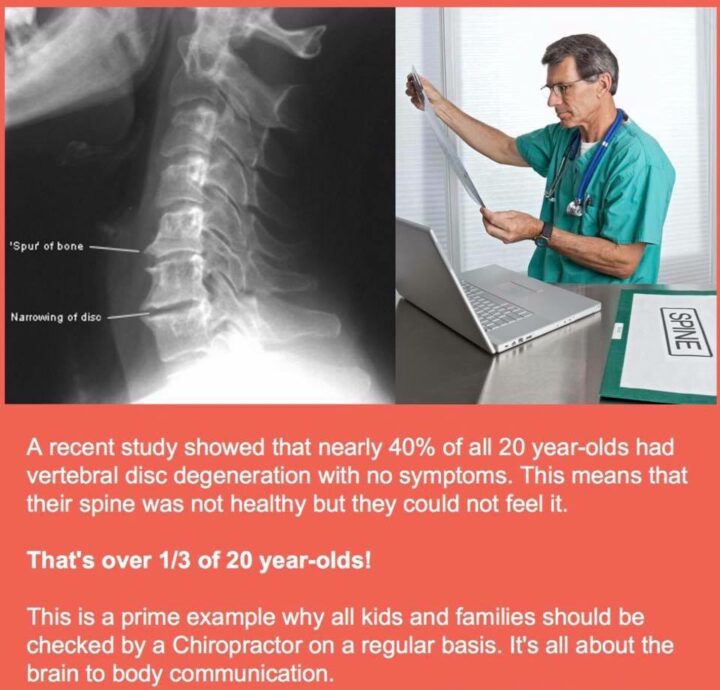

Headaches in the back of the head are often described as a tension-type headaches or even develop into migraines. “Chronic Headaches” may be a more serious concern of blood vessel abnormalities, nerve disorders and side affects from previous traumatic injuries. Up to 80 percent of the adult U.S. population suffers from at least occasional tension headaches, with around 3 percent experiencing chronic daily tension headaches.
First and foremost do not “Normalize” your headaches. They may be common for you and for others, but that certainly doesn’t mean they are normal. Your headaches are a warning signal of something malfunctioning. According to data from the Centers for Disease Control and Prevention as many as one in four ladies under 45 years old are suffering from “severe” headaches or migraines. An estimated 20 million migraine attacks occur every single day.
Undetected and uncorrected spinal and posture problems are the most common cause of headaches, a warning symptom and a tell tale sign that you have spinal stress! Headaches in the back of the head may be caused by a variety of ailments and injuries.
The Medical director at Orange Coast Memorial Medical Center in Fountain Valley, California. Medhat Mikhael, M.D., says, “A lot of women think headaches are something they must simply endure or treat by taking over-the-counter painkillers like ibuprofen or Tylenol, but not only is that not the best treatment it can even be dangerous as using those medications daily can cause serious damage to your kidneys and liver,” he explains. “If your headaches are affecting your daily life, it’s time to see a doctor.” Perhaps it’s time to get a second opinion from someone who specializes the spine, nerve and musculoskeletal system rather then just a general M.D. who may be limited to simply just prescribing more drugs.

Tension-type headaches are the most common form of headache. Caused by muscle tension in the neck and back. While structural imbalances, poor posture, or stress can precipitate this type of headache, metabolic imbalances may also be involved. Although the pain is often described as a non-pulsating, “Tension”. It may often include pressure sensation around the top of the head. The pain typically involves the back of the head, sub-occiput or even both sides of the head, it can range in severity from mild to severe intensity.
According to the new research, tilting your head forward increases the amount of stress—and therefore weight—on your spine. When you tilt just 15 degrees forward, that’s about 27 pounds; at 30 degrees, it’s 40 pounds; at 45 degrees, it’s 49 pounds; and at 60 degrees, it’s 60 pounds of stress.
Not only can that cause a literal pain in your neck, but it also puts stress on your muscles, tendons, and ligaments, writes study author Kenneth K. Hansraj, M.D., chief of spine surgery at New York Spine Surgery & Rehabilitation Medicine. Have your Doctor of Chiropractic evaluate you or your children to address this condition sooner then later the more time that goes by directly relates to more degenerative changes in the spine and nerve system.
 A malfunction located in the cervical spine might have a “domino” effect on the entire musculoskeletal system, the circulatory and the nervous systems, by creating imbalances and dysfunctions in various parts of the body. These malfunctions might turn, over time, into serious health problems.
A malfunction located in the cervical spine might have a “domino” effect on the entire musculoskeletal system, the circulatory and the nervous systems, by creating imbalances and dysfunctions in various parts of the body. These malfunctions might turn, over time, into serious health problems.
The very first bone in the neck is called Atlas or C1 for short and it is a ring like bone at the junction where the head and neck meet. The second neck bone is called Axis or C2 for short and is found just below Atlas. Atlas and Axis together are commonly referred to as the upper cervical spine. The Atlas and Axis are in close proximity to a portion of your central nervous system called the brain stem. The brain stem controls and coordinates virtually all of your body’s vital functions. When damage to the connective tissues occurs due to accidents and injuries, Atlas and Axis can misalign and lock into a stressed abnormal position, resulting in pressure, tension, irritation, disruption to blood flow and cerebrospinal fluid circulation. Atlas/Axis subluxation will also result in Postural Distortion in the spine below.
Here is a list of some of the most common signs and symptoms of Subluxation Complex. Please note that the average case we see in the office will have at least 3 of the following signs and symptoms.
Head trauma of some sort also leads to headaches. When people sustain a whiplash car accident injury 80% of the time they report headaches. Different types of headaches are associated with whiplash injuries. Post-traumatic headaches are due to damage or bruising of the brain. Cervicogenic headaches are generated from nerve irritation in the upper and mid cervical spine and muscular damage of the cervical paraspinal and suboccipital muscles. Occipital Neuralgia is irritation of the occipital nerve causing pain to radiate up the back of the skull.
The average American takes 11-15 medications per year. It’s one of the number one reasons people suffer with chronic headaches, but it’s unlikely in this generation of RX happy pill pushers that an MD would look seriously to the Medications they are routinely recommending to be not only the cause of your headaches, but even more crazy to think they would recommend something as an alternative like corrective care Chiropractic for your pain and suffering. So if you’re still suffering with headaches perhaps it’s time for you to get a second opinion from the experts.
After many decades of promoting aspirin, the FDA now says even if you have a family history of heart disease, if you haven’t had a heart problem, you should not be taking a daily aspirin. On its website, the FDA now says:
“FDA has concluded that the data do not support the use of aspirin as a preventive medication by people who have not had a heart attack, stroke or cardiovascular problems, a use that is called ‘primary prevention.’ In such people, the benefit has not been established but risks — such as dangerous bleeding into the brain or stomach — are still present.”
Rebound headache is a type of headache that results from overuse of pain medications like acetaminophen, asprin, or NSAID’s (nonsteroidal anti-inflammatory drugs), codein, hydrocodone oxycodone, etc. A pain medicine may work for a limited period of time, but as the effect wears off, the headache returns, often worse than it was before. The person then takes more pain medicine, the effects again wear off, and the headache returns (rebound headache).
Vitamin or Mineral Deficiency Headaches
Many headaches, especially when chronic, are due directly or indirectly to nutritional and biochemical imbalances in the body. Research has identified some routine offenders of the biochemical causes of headaches. Stress triggers a cascade of hormones that put your body into fight-or-flight mode, tightening all your muscles and triggering headaches by depleting things like zinc, calcium, magnesium and more. Attention to lifestyle and use of techniques such as supplementation, relaxation and biofeedback are highly recommended to enhance a health program for alleviation of headaches.
The good news is that research has shown in many headache suffering cases are caused by deficiencies of vitamins and other nutrients. This suggests that curing headaches, both short-term and long-term, may just be down to making sure that you’re getting the right amount of nutrition. Here are some supplements that have been shown to help relieve headaches.
According to a research published in the journal CNS and Neurological Disorders Drug Targets by scientists from the Human Genome Center at the University Sains Malaysia, folic acid (vitamin B9) and vitamins B6 and B12 may play a role in migraine triggering and suppression.1 According to this study, deficiencies in these vitamins can trigger migraines.
Annual Scientific Meeting of the American Headache Society in San Diego revealed that a significant portion of kids, teens and young adults who suffer from migraines are mildly deficient in vitamin D, riboflavin and coenzyme Q10.
Further research published in 2009 and spearheaded by a research team from Australia’s Griffith University showed that folic acid and vitamins B6 and B12 can reduce the severity and frequency of migraines among a sample of migraine sufferers.
Another study from Iran published in October 2015’s Electron Physician journal showed that vitamin B2 deficiency could be related to migraine.

By understanding the causes of headaches, success in alleviating them is greatly enhanced.
Have your Doctor of Chiropractic evaluate you or your children to address this condition sooner then later the more time that goes by directly relates to more degenerative changes in the spine and nerve system may occur.
Have your Doctor of Chiropractic evaluate you to rule out other serious causes.
Chiropractors are experts at relieving spinal stress so you can get healthy and stay healthy for a lifetime. Call 844-HELP-815 to have an evaluation.

